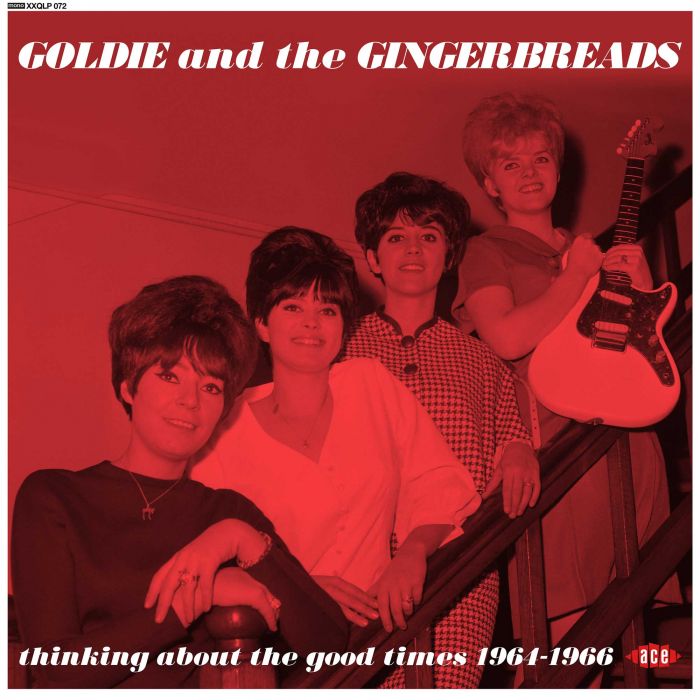MUSIQUE BOUTIQUE: Leslie Winer, Goldie and the Gingerbreads, Laura Nyro

Welcome to Audiofemme’s monthly record review column, Musique Boutique, written by music journo vet Gillian G. Gaar. Every fourth Monday, Musique Boutique offers a cross-section of noteworthy reissues and new releases guaranteed to perk up your ears.

Leslie Winer recorded a remarkable album in 1990. Witch, with its heady mix of dub beats, hip hop, soul, and funk, was trip hop before the term even really been coined. It was then held up in record company limbo and not released until 1993, under the name “©,” by which time it seemed behind the curve. But enough advance copies had circulated among music scenesters in London, where Winer was then based, that the New Musical Express belatedly credited her as “the grandmother of trip hop.”
It was an accolade she was dubious about; “I’m not sure I even know what trip hop is even now,” she told the Quietus in 2012. A compelling new anthology, When I Hit You — You’ll Feel It (Light in the Attic) gives you a broader perspective of her work, drawing from Witch and subsequent recordings, along with a few previously unreleased tracks. Winer’s voice is low and husky, her observations sharp and cutting. The album’s title comes from the song “N1 Ear,” where a rhythmic beat suddenly gives way to a litany of sexual inequality: “If I get raped, it must be my fault, and if I get bashed, I must’ve provoked it.” It’s a dizzying blend of beats and samples, whispered entreaties, and provocative utterances. In addition to the album, Winer’s cover of Tim Buckley’s “Once I Was” (recorded with Maxwell Sterling) is available separately.

One of the pleasures of writing my first book, She’s A Rebel: The History of Women in Rock & Roll, was discovering so many female performers I’d never heard of before. Names like Wanda Jackson and Lady Bo were new to me. I learned that the women hanging out with Barbra Streisand on the inner gatefold sleeve of her Barbra Joan Streisand album were in a band themselves, called Fanny. And then there was the Goldie and the Gingerbreads.
“Who was the first all-women rock ‘n’ roll band?” As the liner notes for the new Gingerbreads’ compilation, Thinking About the Good Times: Complete Recordings 1964-1966 (Ace Records) put it, it’s something of a rhetorical question; after all, groups of women have been playing together since instruments were invented. But Good Times claims the Gingerbreads as the first significant rock ‘n’ roll band: “Of that, there can be little doubt.”
This is a release where the liner notes are just as important as the music, because it’s the first time a full account of the Gingerbreads’ story has been told. The roots of the band were formed when singer Genyusha “Goldie” Zelkovicz (now Genya Ravan) met drummer Ginger Bianco (originally Virginia Panebianco) in New York City in 1962. A series of Gingerbreads came and went, with the lineup that would enter the recording studio solidified by 1964; Goldie, Ginger, keyboardist Margo Lewis, and guitarist Carol MacDonald.
The group dazzled New York society (they were namechecked by Tom Wolfe in an essay for Esquire), and then headed to the U.K., where they opened for the Rolling Stones and the Kinks. They were first to record “Can’t You Hear My Heartbeat” (later a hit for Herman’s Hermits), but this pop confection wasn’t really the Gingerbreads’ forte. They much preferred the steamier flipside, “Little Boy.” This was a group that loved rock and R&B; listen to their rock solid version of “What Kind of Man Are You” by Ray Charles, or the sizzling high energy of “Think About the Good Times.” This collection also has previously unreleased material: a terrifically bluesy “Look For Me Baby;” Goldie’s burning lead vocal on “Sporting Life;” and the instrumental keyboard dazzler “Margo’s Groove.” Goldie & the Gingerbreads laid down a path for other women to follow, and it’s great to see them getting the recognition they deserve.

It’s hard to think of Laura Nyro as being “underrated.” After all, she’s the composer of classics like “Wedding Bell Blues,” “And When I Die,” and “Stoned Soul Picnic” to name a few, and she’s been cited as an influence by any number of musicians (Elton John, Todd Rundgren, Cyndi Lauper). But those songs became hits for other performers; ironically, Nyro’s best-selling single was a song she didn’t write, a cover of Gerry Goffin and Carole King’s “Up On the Roof.” People knew her work, but didn’t necessarily know the artist who created it.
American Dreamer (Madfish/Snapper Music) offers a deep dive into her catalogue with a vinyl box set featuring Nyro’s first seven albums, plus an eighth disc of rarities exclusive to the set. Her first four albums are stunning in their originality, a blend of pop/soul/jazz/avant garde that doesn’t fall into any readily identifiable category, which might not have helped Nyro get on mainstream radio but made her an undeniably compelling performer. Her 1971 album, Gonna Take a Miracle, was a fond look back at her roots: girl group sounds (“I Met Him On a Sunday”) and Motown (“Dancing in the Street”), with vocal backing by Labelle. Smile and Nested examined her life in retreat from the music industry (“Money”) and embracing motherhood (“Child in a Universe”).
The eighth album, Rarities and Live Recordings, brings together such delights as the demo of “Stoned Soul Picnic,” the New York Tendaberry outtake “In the Country Way,” and four tracks from a 1971 gig at the Fillmore East, including a lovely version of “(You Make Me Feel Like) A Natural Woman.” And that’s not the only recent Nyro release. Tree of Ages: Laura Nyro Live in Japan, previously not issued in the US, is now available, and Go Find the Moon: The Audition Tape, a great disc of previously-unreleased material, is due in September.

